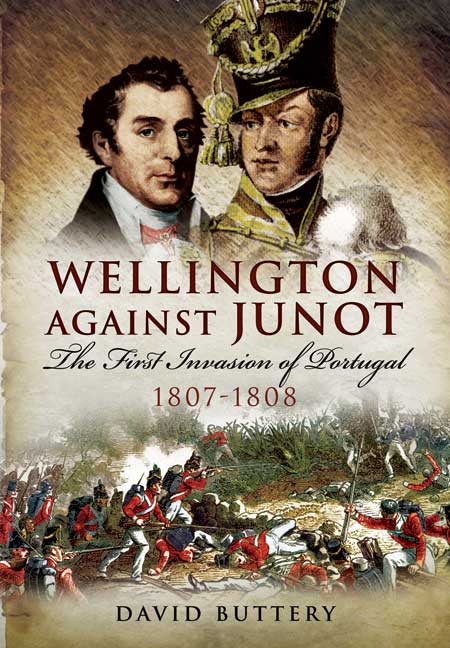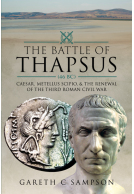Wellington Against Junot (Hardback)
The First Invasion of Portugal 1807-1808
Imprint: Pen & Sword Military
Pages: 224
ISBN: 9781848841420
Published: 4th April 2011
(click here for international delivery rates)
Need a currency converter? Check XE.com for live rates
| Other formats available - Buy the Hardback and get the eBook for free! | Price |
|---|---|
| Wellington Against Junot ePub (7.4 MB) Add to Basket | £6.99 |
The first French invasion of Portugal in 1807 - which was commanded by Junot, one of Napoleon's most experienced generals - was a key event in the long, brutal Peninsular War, and it was the first campaign fought in the Peninsular by Sir Arthur Wellesley, later Duke of Wellington, yet it tends to be overshadowed by more famous episodes in the six-year conflict that followed. David Buttery, in this original and perceptive new study, sets the record straight - his tightly focused narrative covers the entire campaign in vivid detail.
David Buttery should be commended for these two well-written campaign studies. They provide a superb introduction for those interested in the French campaigns in Portugal! Hopefully he will complete the trilogy with a study of the second French invasion of Portugal – that of Marshal Soult’s campaign in northern Portugal during the first half of 1809.
The Napoleon Series - February 2012 - reviewed by Robert Burnham
In conclusion, the subject matter and objectives set for these two studies are entirely relevant. However, a considerable range of material has become available for this period in English, French, Portuguese and Spanish, providing very substantial potential for new insights into specific aspects of the campaigns that would have enhanced their narratives than has actually been included. Nevertheless, the author has widened the scope of the analysis and interpretation of events considerably beyond recent, Anglo-centric approaches covering, for example, the battle of Talavera de la Reina. As result, these two books represent useful, well-written, highly readable and enjoyable introductions to the campaigns of 1807-08 and 1810-11. Questions raised within them will undoubtedly provoke further discussion as to Napoleon’s strategy for the domination of Europe, British interventions in Portugal and Spain, and the outcomes of the war for Iberians, whilst gaps in their coverage of primary sources and their interpretation leave room for further, more comprehensive, consideration by historians more knowledgeable of French, Portuguese and Spanish sources.
The Napoleon Series - May 2013 - reviewed by Anthony Gray
I'll say it from the start ... this book is a magnificent study of the French invasion of Portugal in 1807.
Napoleon Guide, Richard Moore
The two protagonists are - on the British side - General Sir Arthur Wellesley and - on the French - Jean-Andoche Junot.
The former a careful, brilliant commander while the latter was a complex beau sabreur with as many faults as good points.
In Wellington Against Junot, military historian David Buttery has superbly painted the opposing commanders, giving a lot of attention to their careers, their armies and he details what led to Napoleon Bonaparte's decision to attack Portugal.
Wellington Against Junot, Buttery also has a very handy section on Touring the Peninsula where he suggests sights of interests and memorials in Portugal to visit.
This is a must-have for anyone interested in the Peninsular War.
The book' descriptions of the important battles of Vimiero and Rolica are detailed enough to please military historians, but lively enough to interest lay readers too.
Leicestershire & Rutland Lide
They are enhanced by excellent maps and diagrams.
Nowadays the Napoleonic wars are often remembered in the afterglow of Wellington's final victory at Waterloo. But it is important to remember that British invasions of Napoleon's Europe were more often failures than successes. Only when led by the indefatigable Arthur Wellesey was Victory assured, and no one knew this when he took command of the 1808 expedition to Portugal.
Military Times by Matthew Bennett
The book explores the battles in some detail, and is well illustrated by photographs and maps.
The sour after-note is that political blundering at home committed Britain to an over-generous treaty, which allowed the French to withdraw with all their equipment, and on British ships, so undermining Wellington. But he was to return for greater glory later from 1809-1814.
About David Buttery
David Buttery has established a reputation as a leading historian of nineteenth-century British military history. He has made a particular study of the Napoleonic and Crimean wars. He has worked in newspapers and museums and has published extensively in many of the leading military history periodicals including the Victorian Military Society's journal, The Leicestershire Chronicle and Military Illustrated. His most recent books are Wellington Against Massena: The Third Invasion of Portugal 1810-1811, Messenger of Death: Captain Nolan and the Charge of the Light Brigade, Wellington Against Junot: The First Invasion of Portugal 1807-1808 and the Waterloo Battlefield Guide.






















